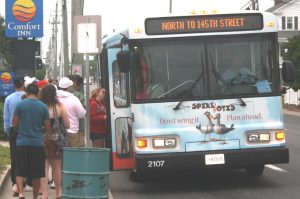
OCEAN CITY – Resort officials this week got a better understanding of how long it would take to transition the town’s transit system from diesel to electric.
In an Ocean City Transportation Committee meeting Tuesday, Transit Manager Rob Shearman presented members with an estimated timeline for transitioning its diesel fleet to electric. While a state committee has recommended local transit systems convert by 2025, he told the committee the town could not meet that mandate.
“We’re not opposed to a transition to electric,” he said. “In fact, we think our system will have fewer obstacles to a transition to electric buses than many of the other systems across the state. But we are just concerned with the aggressiveness of the timeline. We don’t think we’ll have charging infrastructure in place that quickly.”
Earlier this year, the committee began discussing the transportation department’s plans to convert its diesel fleet to electric after receiving a statewide zero-emissions bus study for Ocean City Transit. While no specific mandates have been placed on local transit systems, the town agreed to begin working with a consultant to create a transition plan.
It is estimated that the town’s transition to electric would total $99 million in capital costs and $1.9 million in annual operating costs, and the transition plan would allow the town to receive federal funding to support the project. However, Shearman told committee members Tuesday that a new recommendation from the Maryland Commission on Climate Change could complicate the town’s plans for fleet electrification.
“The larger systems in the state already have an electric vehicle purchase mandate,” he said. “The climate change commission wants to extend that mandate to the local systems by 2025. We’re just not going to be able to meet that.”
Shearman said town representatives would be attending a legislative reception in January to share the concerns with lawmakers. He said the town was opposed to an aggressive timeline.
When asked about the town’s timeline for converting its diesel fleet, Shearman said the town must first complete a transition plan and then work with Delmarva Power to determine electric load needs. From there, the town would have a better understanding of infrastructure costs.
“We’ll come back to you, the committee and the council, ahead of the FY26 budget process with a much clearer picture of those infrastructure costs …,” he said. “But even with council and committee approval, we still need to apply for and receive grant funding in advance of breaking ground on any charging infrastructure. I think we are still probably two, three years out, best case scenario.”
Mayor Rick Meehan said town moving forward as quickly as it could to electrify its fleet.
“I support this and think it’s the right thing to do,” he said. “Let’s just keep on a very strict timeline and move forward as quickly as it allows us to do so.”

